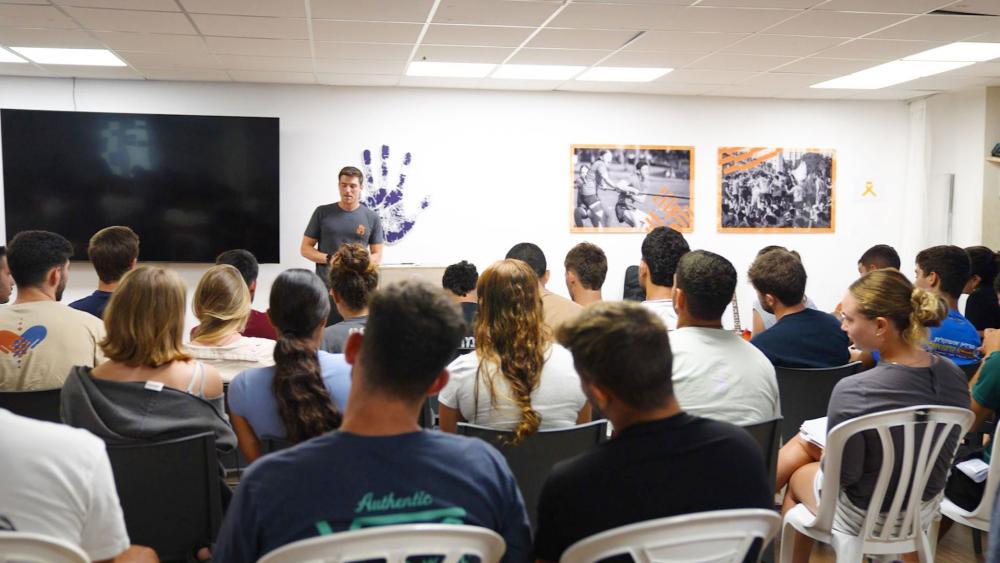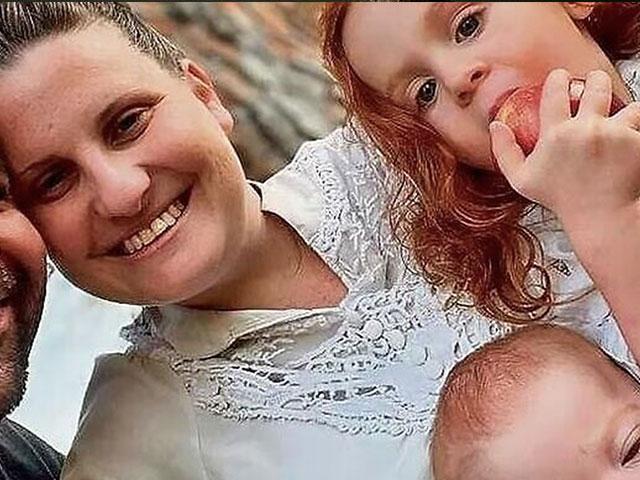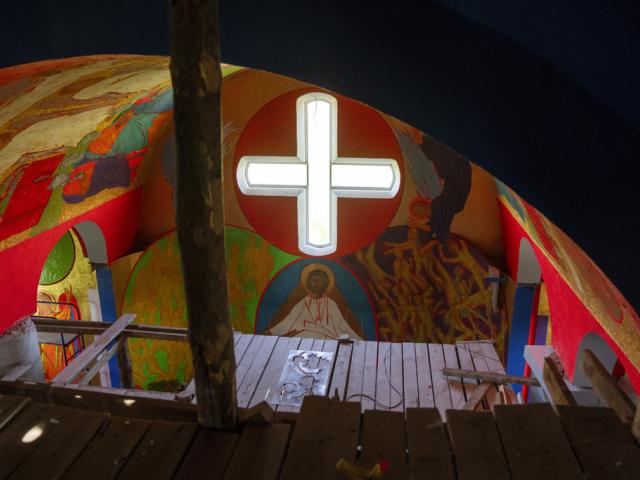ZIKHRON YAAKOV, Israel – When most Israelis finish high school, they're drafted into the military within a year. Some will spend that time after graduation at an Army prep school.
After the October 7th Hamas attack, one such school began a crash course in life for students there.
They call the course "Five Fingers Mechina," which means, whatever you do, do it with your full heart, mind, soul, and strength.
Located in the coastal town of Zikhron Yaakov north of Tel Aviv, the place is like a preparatory school for life, where students learn to give from their hearts and even lay down their lives for the good of others.
Dror Yanai, the head of Five Fingers Mechina, told CBN News, "It's a way of life. It's, for me – it's a philosophy."
A former Navy Seal, Yanai leads the Five Fingers Mechina – a one-year program helping young people get ready for challenges they'll face in the Israel Defense Forces and life overall.
"It's a value that you understand from day one that you come to the base," he explained. "You understand that everything you do, do it till the end. With yourself, feel that you do the best that you can."
Key principles include training the mind and body in the Five Fingers method with a focus on community outreach and social awareness.
Zur Feldman, a Five Fingers board member, told us, "It's very hard to test those things on a normal course of life. It takes time to see the impact."
This past year, 67 students from Israel and other countries took part in the 10-month program. It began about a month before the October 7th war.
Feldman says their crash course came from the nation's attempt to deal with the impact and repercussions of the Hamas attack.
"What the Mechina did was amazing. In a week, there was a whole program created to help kids that (were)refugees from the south in Eilat, and that was their mission," he stated. "And the kids that were supposed to be trained, they were the trainers of the kids that came from the south."
Suddenly the situation put students in a real-life test.
Feldman noted, "It was amazing to see how those kids became not only kids, but they were becoming like teachers, like coaches for kids – and not for kids that they know, but kids that came with all the impact and all the horror that they've seen – and it was unbelievable."
So far, 15 past graduates have died during the war – a high percentage the leaders attribute to many serving in top units, and their willingness to lay down their lives for others.
CBN News met three students from the U.S. and Canada who joined the school.
Gil Dori, 19, from Philadelphia, finished this year as part of the school's sixth graduating class.
"I'm doing a gap year before the Army, after high school. a very special year – a year, where I wanted to better myself, a year where I wanted to learn new things," he told us. "I wanted to come to Israel, learn the culture, and learn the language."
While Dori, The grandson of the IDF's first chief of staff, didn't have to serve in the Army, he chose to do so.
"It's been great. There's been rough parts, but overall it's been a great year. After the war and everything we've done, and the whole year that we spent here, I think there's nothing more meaningful that I've done in my life than this," he declared.
After the war started, Dori first worked with evacuated children in the Dead Sea and Eilat areas. While family members in the States wanted him to come home, he decided to stay.
"And actually, my dad, about a week (or less) after the war started, he immediately came here. He took time off work. He came here. He's a doctor. So he went and volunteered in the South with (Magen David Adom) and the ambulances. And he volunteered in hospitals and stuff like that."
Another Five Fingers Mechina student, Liihie Friedman, was born in Israel and moved to Baltimore, Maryland when she was eight years old. She returned to the program last summer.
She recalled, "When October 7th happened, I went back home (to Israel) from all the worries. No one really knew anything. So, I went home for a week and a half, and I heard that we were moving down south, to volunteer and help kids who had to move from their homes because of the war; and I told my parents, I'm coming back, I don't care, I want to help. I want to find where I can help. I came here for a reason. I came here to help."
Friedman believes that while it's difficult being away from her family, she made the right choice.
"It gave me a lot of skills, all of the things that I wanted to use. so I'm glad it happened, she said. "It's definitely the hardest year that I've ever had in my life. But like, the best year – wouldn't want to do anything else."
Despite the challenges of helping children who have had to deal with tragedy, Friedman insists it's worth it.
"It was definitely hard, hearing all the trauma they went through, while we don't know what's going on, what will happen next? So it's definitely hard, but at the end, we really just saw how impactful we were."
She added, "They still talk to us. It's just crazy. We really made a connection with people that we never knew we would ever meet in our lives."
Friedman eventually would like to become a combat instructor.
"I love America. I really do," she confessed, "but I was born here (in Israel). This is where I belong. I'm Israeli. I'm Jewish. This is the Jewish country. and I just, this is where I need to be."
Another graduate, Ezra Abraham from Toronto, Canada, first came to Israel more than two years ago.
I just felt something different in the air. I just loved it," he remembered. "I felt like I'm myself here. Isn't that weird – that a place I've never been in my life, that I've never really learned about, another language? I feel like I'm – I'm supposed to be here."
Abraham continued, "My life goal is to get to go to the Army, draft into combat to protect this country that I love so much – eventually live here and raise kids here and live here."
Abraham came to the mechina to enter the draft. Then, October 7th happened.
"My mom called me and she said, 'Ezra, you're coming home,' he recollected. "I said, 'It's not happening. I'm sorry. I'm part of them.' I joined the Israeli culture, and this is the ultimate test."
He added, "Now that I'm inside the Israeli society, I joined the mechina. I'm one of them. If they're all struggling, I'm struggling. If they go to war, I go to war."
A few weeks later they became certified coaches, helping evacuees in Eilat.
"We basically taught these kids values and gave them a reason to wake up every morning in order to do these workouts," Abraham said. "Even when I wasn't giving them workouts, I was just with them. I was that big brother."
He continued, "They can spill out their hearts and everything, they can tell me whatever they want – and that's what it's like. When I say, when some kid is having a little bit of a meltdown and I ask him, 'Where's dad? Can I talk to Dad?' "(He answers, 'Dad's a hostage.' What do you say to that?"
While he entered here as a student, Abraham says the war helped him quickly mature.
"I didn't experience too much hardship on October 7th, other than being here," he stated. "The story is these kids and giving back to these kids that went through so much – kids that are eight years old to have fathers that are hostages in Gaza. There's there's nothing better than giving back to these people. It's the ultimate goal."
Dori summed up what the year has meant to him.
"I always said to myself when I was in high school and stuff, (I) wish there was a school that taught me about life, about me, taught me about how I can be a better person and real things that can help me out in life – not just the history of this and this, or this math that I'll never use. And this is that. This is exactly that. Sitting through these lectures and stuff (are) lessons that you can take to your life, that then you can process and use onward – and that's like the gold that lies here."
***Please sign up for CBN Newsletters and download the CBN News app to ensure you keep receiving the latest news from a distinctly Christian perspective.***
Did you know?
God is everywhere—even in the news. That’s why we view every news story through the lens of faith. We are committed to delivering quality independent Christian journalism you can trust. But it takes a lot of hard work, time, and money to do what we do. Help us continue to be a voice for truth in the media by supporting CBN News for as little as $1.












 Support CBN News
Support CBN News







